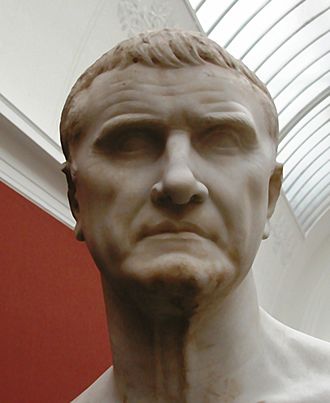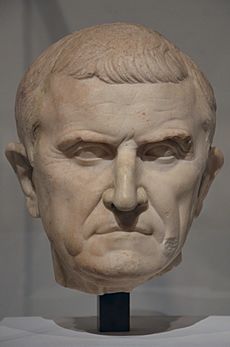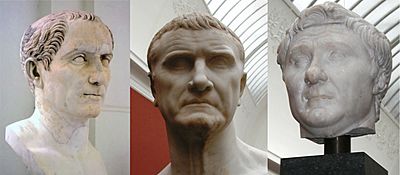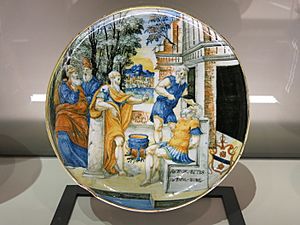Marcus Licinius Crassus facts for kids
Quick facts for kids
Marcus Licinius Crassus
|
|
|---|---|

Bust of Crassus, in the Ny Carlsberg Glyptotek, Copenhagen
|
|
| Born | 115 BC |
| Died | 53 BC (aged 61–62) |
| Cause of death | Killed in action |
| Nationality | Roman |
| Occupation | Military commander and politician |
| Organization | First Triumvirate |
| Office | Roman Consul (70 and 55 BC) |
| Spouse(s) | Tertulla |
| Children | Marcus & Publius Licinius Crassus |
| Parent(s) | Publius Licinius Crassus & Venuleia |
| Family | gens Licinia |
| Military service | |
| Allegiance | Rome Sulla |
| Years of service | 86-53 BC |
| Battles/wars |
|
Marcus Licinius Crassus (115 – 53 BC) was an important Roman general and politician. He played a big part in changing the Roman Republic into the Roman Empire. Many people called him "the richest man in Rome."
Crassus started his career as a military leader under Lucius Cornelius Sulla during a civil war. After Sulla became a powerful ruler, Crassus made a huge fortune, mostly by buying and selling property. He became a well-known politician after defeating the slave revolt led by Spartacus. He even shared the top political job, consul, with his rival Pompey the Great.
Crassus was a supporter of Julius Caesar. He joined Caesar and Pompey in a powerful, unofficial group called the First Triumvirate. These three men controlled the Roman political system. But their alliance didn't last long because of their different goals and rivalries. Crassus and Caesar were always friends, but Crassus and Pompey didn't like each other. Pompey also became jealous of Caesar's amazing victories in the Gallic Wars. The alliance was strengthened again in 56 BC. After this, Crassus and Pompey served as consuls together once more. Crassus then became the governor of Roman Syria. He used Syria to start a military campaign against the Parthian Empire, a long-time enemy of Rome. This campaign was a terrible failure. It ended with Crassus's defeat and death at the Battle of Carrhae.
Crassus's death broke the alliance between Caesar and Pompey for good. His wealth and political influence had kept the two powerful generals balanced. Within four years of Crassus's death, Caesar started a civil war against Pompey and his supporters.
Contents
- Crassus's Family and Early Life
- Starting His Military Career
- How Crassus Became Rich and Powerful
- Crassus and the Slave Revolt
- The First Triumvirate: Alliance with Pompey and Caesar
- Governor of Syria and His Death
- Key Dates in Crassus's Life
- Crassus in Books, Movies, and Games
- Images for kids
- See also
Crassus's Family and Early Life
Marcus Licinius Crassus belonged to the gens Licinia, a very old and respected family in Rome. His father, Publius Licinius Crassus, was an important senator and a former consul.
Crassus's family lost much of its wealth during a time of political trouble in Rome. His father and younger brother died when they were hunted down by the supporters of Gaius Marius. Crassus had to rebuild his family's fortune.
Starting His Military Career
After a period of political unrest, Crassus had to flee Rome. He went to Hispania (modern-day Spain) from 87 to 84 BC. There, he gathered an army of 2,500 men from people who had connections to his father. He used this army to get money from local cities to pay for his campaigns.
Later, Crassus joined Lucius Cornelius Sulla, a powerful Roman general. Crassus fought bravely in Sulla's civil war. He commanded the right side of Sulla's army in the important Battle of the Colline Gate. Crassus's success in this battle helped Sulla win control of Rome. Because of his loyalty and help, Crassus was in a strong position with Sulla.
How Crassus Became Rich and Powerful

Crassus's main goal after the civil war was to get his family's wealth back. Sulla's government took property from its enemies and sold it cheaply. Crassus bought a lot of this property. This helped him become incredibly rich.
Historians say Crassus's wealth grew from a small amount to about 7,100 talents of gold. This was a huge sum, worth billions of dollars today. Much of this wealth came from buying property during difficult times.
Crassus also made money in clever ways:
- He bought and sold slaves.
- He owned silver mines.
- He bought buildings that had burned down or collapsed at very low prices. He then used his slaves, who were skilled builders, to fix them up. This way, he bought a large part of Rome.
- He created Rome's first fire brigade. When a building caught fire, his 500 firefighters would rush to the scene. But they wouldn't put out the fire until Crassus offered to buy the burning building from the owner for a very low price. If the owner agreed, his men would put out the fire. If not, they would let it burn. After buying many properties this way, he rebuilt them and rented them out.
After becoming rich, Crassus focused on his political career. He was a wealthy supporter of Sulla and came from an important family. But he faced a challenge from Pompey the Great, who was also very successful. Crassus's rivalry with Pompey affected his future decisions.
Crassus and the Slave Revolt
Crassus was elected praetor in 73 BC. This was an important step in his political career.
During the Third Servile War, a huge slave revolt led by Spartacus (73-71 BC), Crassus offered to lead new troops. Several Roman armies had already been defeated. The Roman Senate sent Crassus to fight Spartacus.
At first, Crassus had trouble. To make his army fight better, he brought back an old, harsh punishment called decimation. This meant executing one out of every ten soldiers if they ran away from battle. This punishment was very scary, but it made his troops fight much harder.
Spartacus and his army retreated to southern Italy. Crassus tried to trap them by building a huge ditch and wall across the peninsula, from one sea to the other. But Spartacus and some of his men managed to escape during a snowstorm.
Later, other Roman armies, led by Pompey, were called back to Italy. Spartacus decided to fight Crassus rather than be trapped between three armies. In the final battle, the Battle of the Silarius River, Crassus won a big victory. Six thousand slaves were captured alive. Spartacus himself is believed to have died in the battle, though his body was never found.
Crassus ended the slave revolt in 71 BC. However, Pompey arrived and helped deal with the remaining escaped slaves. Pompey then claimed much of the credit for ending the war. This made Crassus upset.
Crassus and Pompey were both elected consuls in 70 BC. They often disagreed and their time as consuls was not very productive. Crassus showed off his wealth by holding huge public feasts and giving out grain to families. This helped him gain support from the common people.
The First Triumvirate: Alliance with Pompey and Caesar
In 65 BC, Crassus became a censor, another important political role. During this time, Crassus became a strong supporter and financial backer of Julius Caesar. He helped Caesar get elected to important positions.
Caesar helped Crassus and Pompey become allies, even though they were rivals. In 60 BC, they formed the First Triumvirate. This was a secret political alliance between Crassus, Pompey, and Caesar. They worked together to control Roman politics. This alliance lasted until Crassus's death.
In 54 BC, Crassus took money from the treasury of the Second Temple in Jerusalem.
In 55 BC, Crassus and Pompey were consuls again. A law was passed that gave Pompey control of Spain and Crassus control of Roman Syria for five years.
Governor of Syria and His Death
Crassus received Syria as his province. Syria was known for its great wealth. But Crassus also wanted military glory, just like Pompey and Caesar. He decided to invade Parthia, a powerful empire to the east.
The king of Armenia offered Crassus a large army of 40,000 troops. He suggested Crassus invade Parthia through Armenia, which would be a safer route. But Crassus refused. He chose a more direct route, crossing the Euphrates river. He was tricked by a local leader who was secretly working for the Parthians. This leader led Crassus's army into a dry, desolate desert.
In 53 BC, Crassus's legions faced the Parthian army at the Battle of Carrhae (modern Harran, Turkey). Crassus's army was mostly heavy infantry, but they were not ready for the Parthian fighting style. The Parthians had skilled horse archers who used hit-and-run tactics. They could shoot arrows while riding away, making it hard for the Romans to fight back. The Parthians also had camels carrying extra arrows, so they could keep shooting without stopping.
The Romans suffered heavy losses. Crassus refused to change his battle plan. His men were forced to retreat to Carrhae, leaving many wounded soldiers behind.
Crassus's men were close to rebelling. They demanded he meet with the Parthian general, Surena, who had offered to talk. Crassus, sad about his son Publius dying in the battle, finally agreed. But when Crassus rode to the Parthian camp for peace talks, his officer suspected a trap. A fight broke out, and Crassus and his Roman party were killed.
A story later spread that the Parthians poured melted gold into Crassus's mouth. This was a symbolic way to mock his great desire for wealth. His head was also taken to the Parthian king during a celebration.
Key Dates in Crassus's Life
- 115 BC – Crassus is born in Rome.
- 87 BC – Crassus flees to Hispania from his enemies.
- 84 BC – He joins Sulla against Marius.
- 82 BC – Crassus leads the winning right wing of Sulla's army at the Battle of the Colline Gate.
- 73 BC – The revolt of Spartacus begins. Crassus likely serves as praetor.
- 72 BC – Crassus is given special command of the war against Spartacus.
- 71 BC – Crassus defeats the slave armies and is elected consul.
- 70 BC – Crassus and Pompey serve as consuls together.
- 65 BC – Crassus becomes a censor.
- 59 BC – The First Triumvirate is formed with Caesar as consul.
- 56 BC – The Triumvirate meets at Lucca.
- 55 BC – Crassus and Pompey serve as consuls again. Crassus leaves for Syria in November.
- 54 BC – Crassus begins his campaign against the Parthians.
- 53 BC – Crassus dies in the Battle of Carrhae.
Crassus in Books, Movies, and Games
Crassus has appeared in many stories and works of art:
- Literature
- He is a main character in Howard Fast's 1951 novel Spartacus.
- He appears in Alfred Duggan's 1956 novel Winter Quarters.
- Crassus is a character in Steven Saylor's novels, including Arms of Nemesis.
- He is featured in Conn Iggulden's Emperor series.
- The Battle of Carrhae is central to Ben Kane's novel The Forgotten Legion.
- Crassus is a major character in Robert Harris' novels Lustrum and Imperium.
- He appears in Colleen McCullough's novels Fortune's Favourites and Caesar's Women.
- Ballet
- Crassus has a main role in Aram Khachaturian's 1956 ballet Spartacus.
- Film
- Crassus is a main character in the 1960 film Spartacus, played by Laurence Olivier.
- He is the bad guy in the 1962 film The Slave.
- A made-up version of Crassus appears in the film Amazons and Gladiators (2001).
- Television
- Crassus is a main character in the 2004 TV film Spartacus.
- He appears in an episode of Xena: Warrior Princess.
- He is played by Simon Merrells in Spartacus: War of the Damned.
- Crassus was mentioned in the TV show Horrible Histories with a song.
- He appears in the second season of the Netflix series Roman Empire.
- Music
- Crassus is one of the narrators in Jeff Wayne's Musical Version of Spartacus.
- Video games
- Crassus appears as a villain in Spartan: Total Warrior.
- He appears as a Great Merchant in Sid Meier's Civilization V and Sid Meier's Civilization VI.
- Crassus is a hero centurion in Praetorians.
- He is referenced in Deep Rock Galactic as an enemy.
- Crassus appears as a character who gives you tasks in Grand Ages: Rome.
Images for kids
-
A Roman bust of Pompey the Great.
See also
 In Spanish: Craso para niños
In Spanish: Craso para niños
 | Mary Eliza Mahoney |
 | Susie King Taylor |
 | Ida Gray |
 | Eliza Ann Grier |





